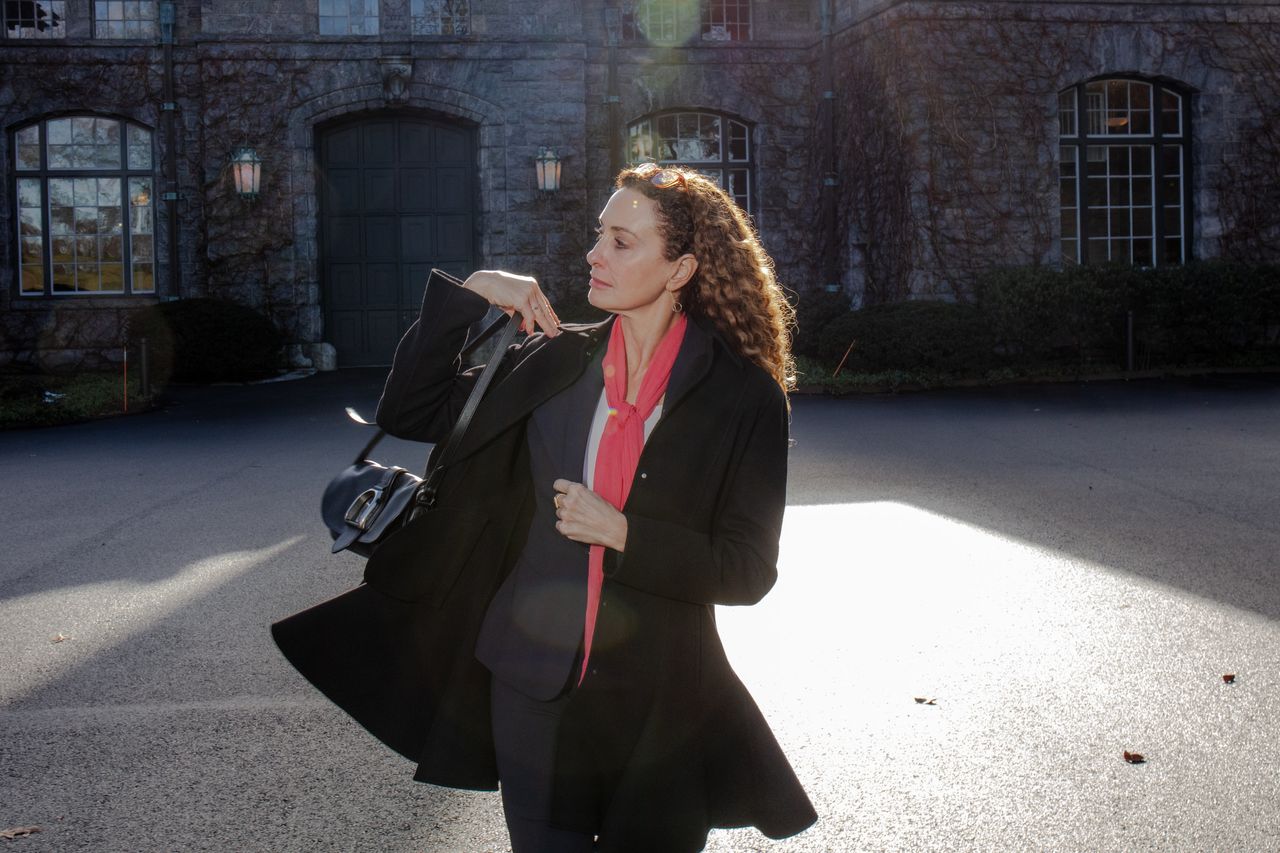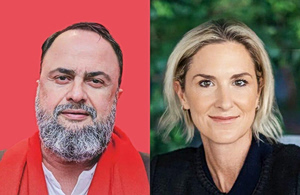A fifth-generation heir to the Rockefeller fortune, Miranda Kaiser was busy raising her children in Florence, Italy, when her older brother presented her with his dying wish almost five years ago.
After being diagnosed with terminal brain cancer, David Kaiser asked his only sibling to become the new standard-bearer for the campaign he had started against Exxon Mobil and other oil companies over what he saw as the industry’s deception about climate change and responsibility for its consequences.
The siblings’ great-great-grandfather, John D. Rockefeller Sr., founded Standard Oil, the monopoly that begot Exxon. Costly and controversial, David’s campaign effectively pitted the founding family against the company that had generated much of its enormous wealth.
David’s request came as the effort, funded by the family’s powerful charities, was faltering. In December of 2019, a New York state judge cleared Exxon on fraud charges in a case alleging the company misled investors about the impact of climate regulation on its business. Exxon openly attacked the Rockefeller effort as a politically motivated conspiracy between Democratic attorneys general and environmentalists.
Following the New York trial, Exxon declared victory. The future of the campaign looked precarious.
Thousands of miles away, Miranda wasn’t well positioned to get it back on track. A lawyer by training, she was running a nonprofit she founded to help immigrants in Italy and managing the end of her marriage. But she couldn’t say no to her brother.
“He was smart enough to know that he had probably only months to live,” Kaiser said during an interview at the family’s sprawling ancestral estate in Pocantico Hills, perched above the Hudson River. “He also knew that if this was his dying wish for me that I would do it no matter what and without limits.”
In July of 2020, David died at a family home in Maine. He was 50 years old.
In the years since, Miranda hasn’t merely continued his campaign—she has escalated it.
The Rockefeller Family Fund, the charity she is president of, is funding litigation and other support for more than 30 lawsuits around the U.S. against the fossil fuel industry. Exxon is a defendant in all of them. Fund staffers also consult with state attorneys general, nine of whom have brought cases against Exxon. The cases aim to collect billions of dollars from Exxon and its peers for their contributions to climate change and the damages caused by it.
Inside Exxon, the efforts have prompted equal parts outrage and concern. Executives view the lawsuits as meritless, but fear juries in blue states might eagerly hand down massive penalties against Exxon, say people close to the company.
Kaiser’s campaign is making a “mockery of the legal system,” said Exxon spokeswoman Emily Mir, adding: “Using family wealth and status to do their personal bidding is somewhere between privileged and unethical, and even more importantly, it does nothing to lower emissions.”
Exxon Chief Executive Darren Woods said the New York case, in which the company turned over millions of documents, showed the Texas-based oil giant had nothing to hide. (The Wall Street Journal last year reported on some of the documents , which showed that under Woods’ predecessor executives strategized over how to diminish climate concerns.)
“You want to go back 40 years or 30 years and talk about what was said then and out of context versus what we’re doing today…then I’m happy to be judged by that,” Woods said in an interview.
Woods has said that Exxon is committed to reducing emissions while also providing affordable oil and gas that he says remain critical to the global economy.
The company vowed to spend $20 billion between 2022 and 2027 on curbing its emissions and helping other companies do the same, investing in areas including carbon capture and biofuels, though the overwhelming majority of its investment remains in oil and gas.
Of the litigation, Woods said: “It’s just another channel the activists are trying to leverage to change the corporation.”
Flanked by portraits of her family in the estate’s Abeyton Lodge, including two governors and a U.S. vice president, Kaiser described the campaign as a moral imperative for the Rockefellers, who derived so much wealth from fossil fuels.
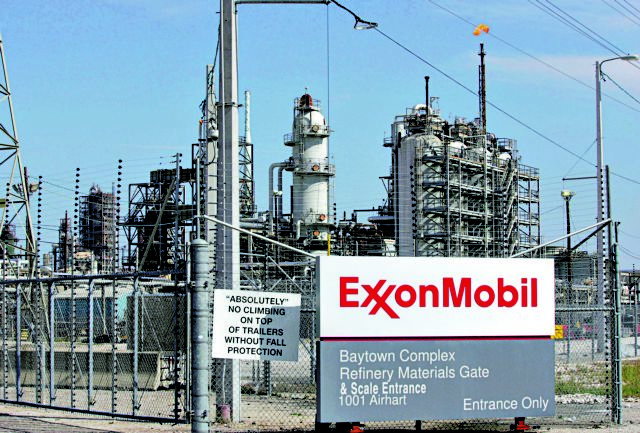
A view of the Exxon Mobil refinery in Baytown, Texas September 15, 2008. REUTERS/Jessica Rinaldi/File Photo
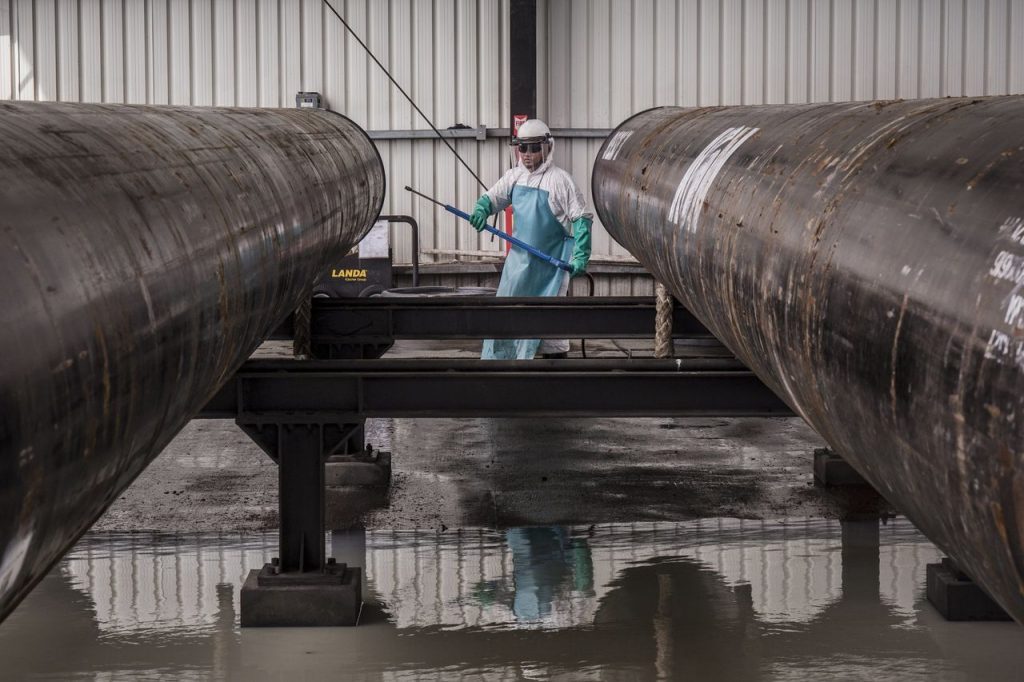
Equipment is staged on a wharf in Guyana, where Exxon has discovered vast amounts of oil. PHOTO: OSCAR B. CASTILLO FOR THE WALL STREET JOURNAL
“It would be unconscionable to benefit from something that you then know is harming the world and not do something about it,” Kaiser said.
The Tudor-styled lodge, formerly named “the Playhouse,” was commissioned in 1924 as a family retreat. Oak-paneled rooms adorned with rugs gifted by King Hassan II of Morocco connect to two bowling alleys, indoor tennis and squash courts, and an indoor pool that has since been decked over.
In addition to heading the Rockefeller Family Fund, Kaiser also sits on the board of the Rockefeller Brothers Fund, a larger charity that has also funded litigation. In 2022, that fund promised to spend $100 million to address climate change over the next 10 years.
The charities are quite active, fighting the development of major fossil fuel projects as well as underwriting academic research into the industry’s contributions to climate change. Family Fund staffers have lobbied state and federal lawmakers to pass “climate superfund” bills that would force companies to pay for damages from carbon emissions, including one in Vermont the state legislature recently approved.
The Family Fund influenced President Biden’s decision in January to pause approval of new liquefied natural gas exports.
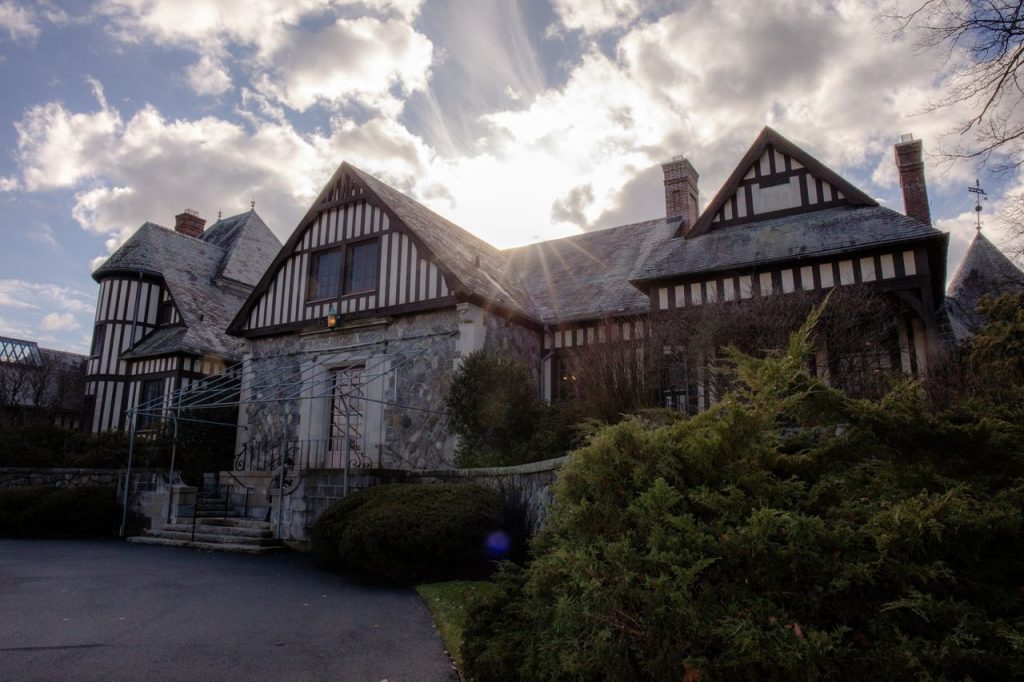
Now called Abeyton Lodge, the ’Playhouse’ at the Pocantico estate houses games rooms, a bowling alley and tennis courts. PHOTO: NATALIE KEYSSAR FOR THE WALL STREET JOURNAL
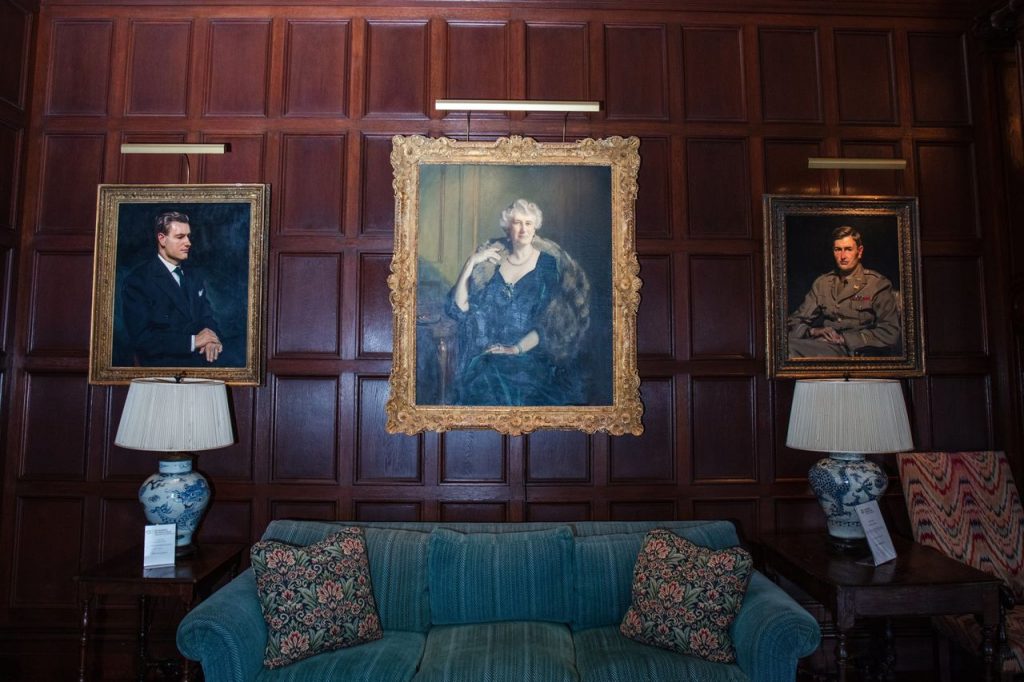
Portraits of Rockefeller family members adorn a wall of Abeyton Lodge. PHOTO: NATALIE KEYSSAR FOR THE WALL STREET JOURNAL
The number of climate-related cases against Exxon continues to grow. In February, the city of Chicago sued Exxon and other major oil companies alleging they deceived Chicagoans about climate change. In March, Bucks County, Penn., filed a similar suit. The Center for Climate Integrity, an environmental group the Rockefeller charities helped create, swayed officials in both places to bring the suits.
The litigation aspires to have a similar impact as the cases against tobacco companies in the 1990s for the harms of smoking.
Kaiser, who has degrees in law and forestry from Yale University, was once a cattle rancher and served as deputy counsel on the United Nations’ independent committee that found massive corruption in the Iraq Oil-For-Food Program .
These days, what started as a personal promise to her brother has become a consuming mission. Kaiser said she believes that there is a global climate crisis that only exists because Exxon and its peers were “so dishonest and greedy.”
“Darren Woods and the others cannot have a seat at the table until they are completely honest about what they’ve been doing,” said Kaiser.
Family Legacy
Kaiser says she didn’t fully realize what it meant to be a Rockefeller as a child. Her mother, Neva Rockefeller Goodwin, was uncomfortable with being part of the iconic family and shielded her only daughter from its trappings.
“She had a lot of guilt around it,” Kaiser said. At the time, there was little talk of climate change, she added: “It was more just guilt over having money when so many people didn’t.”
During her youth, Kaiser’s mother mostly kept her away from Pocantico, which means “stream between hills” in Algonquin. The estate sits on more than 3,000 acres and at one time featured dozens of houses and a network of carriage roads. Some of it is now part of the National Trust for Historic Preservation, though the Rockefellers lease it back for gatherings.
The Rockellers are collectively worth more than $10 billion, according to Forbes, and have given huge amounts to charity over the past decades. Rockefeller Sr. established the Rockefeller Foundation in perpetuity in 1913, and gave away about $540 million in total to charity, more than $10 billion in today’s dollars. His charity helped curb yellow fever and created academic institutions around the country. That legacy of philanthropy has passed through generations of the family.
The Rockefeller Family Fund, a charity created in 1967 by John D. Rockefeller Jr.’s children, worked on environmental protection for decades but began focusing on climate change in the early 2000s.
At the family’s periodic meetings at Pocantico, Kaiser keeps relatives apprised of the latest on the campaign. The meetings are so large—usually over 200 family members—that everyone wears a nametag. She says there is broad but not unanimous support for the effort, despite the unwanted attention it’s brought to a family that’s mostly adhered to a patrician sense of privacy.
“We have actually tried really hard to stay out of the public eye,” said Kaiser. “So this is breaking that mold and we’re a big family and there is a diversity of opinion on all sorts of things and diverse politics.”
Kaiser says she mostly votes for Democrats, a detour from a family long synonymous with the establishment wing of the Republican Party.
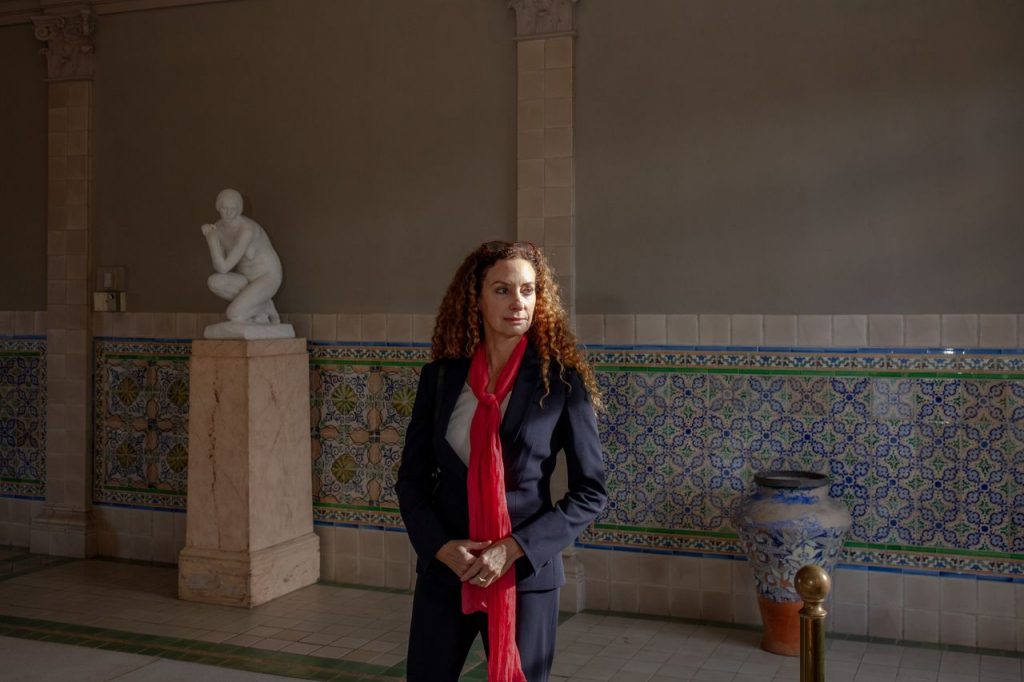
Miranda Kaiser, standing in the Abeyton Lodge at the Pocantico estate, vows to keep up the fight against Exxon. PHOTO: NATALIE KEYSSAR FOR THE WALL STREET JOURNAL
Ariana Rockefeller, Kaiser’s cousin, has spoken out against the endeavor. A model and equestrian, she has called the Exxon campaign “deeply misguided.” She didn’t respond to requests for comment.
For decades, Exxon and members of the Rockefeller clan kept close ties. The family and their charities held large amounts of Exxon stock. Kaiser’s grandfather David Rockefeller , who ran Chase Manhattan bank for more than a decade, periodically dined with former Exxon Chief Executive Lee Raymond .
Relations started to deteriorate in the early 2000s. In a now-infamous 2006 lunch, David Rockefeller brought Goodwin—his daughter and Kaiser’s mother—to lunch with Raymond and Rex Tillerson , Raymond’s successor. At a restaurant overlooking the skating rink at New York City’s Rockefeller Center, Goodwin asked the two Exxon bosses why they weren’t investing in green energy. Raymond responded that Exxon had, but the investments didn’t work.
Goodwin found the response unsatisfying and two years later she galvanized family support for several shareholder resolutions urging change at Exxon, including addressing climate change. The resolutions failed, but many within the family had soured on Exxon over its perceived deception about climate change.
Scorched Earth
By 2015, war was brewing between the two sides. That fall, a series of stories by the Los Angeles Times and Columbia Journalism School and a separate series by InsideClimate News showed Exxon had for decades internally modeled dramatic changes to the climate due to fossil fuel use. Raymond and others had for years said publicly that climate science was unclear.
The journalism projects had been quietly funded by Rockefeller charities, which provided more than $500,000 for the efforts. Before the stories ran, Rockefeller Family Fund director Lee Wasserman privately urged the New York Attorney General to launch an investigation into Exxon.
Meanwhile, at a Pocantico retreat in October 2015, the Rockefellers decided to accelerate the divestment of the significant fossil fuel holdings in various trusts and funds controlled by the family. After the stories ran, environmental groups launched a media blitz, attacking Exxon over the stories’ findings using the hashtag #Exxonknew.
Exxon was caught flat-footed and executives were seething, according to people familiar with the matter.
The company turned to FTI Consulting , a globe-spanning business consulting firm, to scrutinize the Rockefeller charities and formulate a communications strategy. By early 2016, Exxon concluded the Rockefellers were behind a politically motivated attack on the company. FTI’s work was overseen by Exxon’s seniormost public affairs executives and most rank-and-file staff were walled off from the effort.
As the fight became public, polling and focus groups commissioned by Exxon showed that the idea the Rockefellers had turned against the oil giant was hugely damaging to the company’s reputation, people familiar with the matter said. Exxon executives concluded they had to punch back.
FTI circulated stories with reporters about what it labeled a “conspiracy” by the Rockefeller charities and wrote blog posts attacking the campaign on a website called Energy in Depth. FTI helped create the site years earlier for the lobbying group Independent Petroleum Association of America, which Exxon was a member of until 2022. Since 2015, the site has published more than 200 posts critical of the Rockefeller effort.

A Mobilgas Pegasus logo hangs near workers during lunch hour on campus at the Exxon Mobil headquarters in Spring, Texas. PHOTO: MERIDITH KOHUT FOR THE WALL STREET JOURNAL
Exxon also enlisted one of the country’s most powerful law firms, Paul, Weiss, Rifkind, Wharton & Garrison. Paul Weiss represents Exxon in many of the climate change lawsuits. The firm sued the New York and Massachusetts attorneys generals, asking a federal judge in Dallas to shut down their investigations into Exxon, and subpoenaed the Rockefeller Family Fund for its communications with those offices.
In court documents Exxon’s lawyers quoted a tweet by Wasserman’s daughter, who had just graduated from college and worked for another environmental group, praising her father’s work on Exxon, arguing the tweet was evidence of an “unlawful conspiracy” between the Rockefeller charities and other environmental groups.
“It’s pretty despicable to go after family members,” Wasserman said.
In a December 2016 meeting, following Exxon’s rapidly amplifying response to the Rockefellers, an external adviser urged caution. Sarah Labowitz, a member of Exxon’s External Citizenship Advisory Panel, warned the company a scorched-earth campaign would come with blowback, according to people briefed on the meeting.
Jack Williams , a member of Exxon’s management committee composed of the company’s most-senior executives, said Exxon wouldn’t be bullied, according to the people.
“Even if you win this, you lose,” said Labowitz, a former policy adviser at the State Department. She sent Exxon a resignation letter weeks later, citing attacks “on respected civil society organizations through the courts.”
Hacked Documents
Mistrust between Exxon and the Rockefellers would soon hit a new low. In 2019, federal authorities arrested an Israeli private detective in an alleged hacking-for-hire scheme targeting a wide range of individuals, including Rockefeller charity staffers and other environmentalists.
After he pleaded guilty to conspiracy and wire-fraud charges, federal prosecutors said in a sentencing memorandum that stolen documents were leaked to the press and “appeared designed to undermine the integrity” of investigations into Exxon. The company and its lawyers subsequently cited the documents in defense of Exxon, prosecutors said.
Exxon hasn’t been accused of any wrongdoing, and an Exxon spokeswoman said the company “had no involvement in or knowledge of any hacking activities, and to be clear we have done nothing wrong.”
Kaiser said she’d seen nothing to indicate Exxon was involved in the hacking, but said it was clear the company had benefited from the campaign .
“They’re just so good at being bad,” she said.
Breaking Tradition
By some measures, the Rockefeller effort has been unsuccessful. Exxon’s stock hit a record price in April, and the company netted $36 billion in profits last year. A federal judge in San Francisco dismissed a case against Exxon in 2018, ruling that the courts are an improper place for addressing climate change; the following year, Exxon won the New York case after a state judge said fraud allegations against it had no merit.
Despite that, Kaiser believes the campaign is picking up steam. In April 2023, the U.S. Supreme Court declined to consider appeals by Exxon and other oil companies seeking to move most of the cases from state to federal court, a decision that allows the cases to proceed in venues the plaintiffs view as friendlier.
A case brought by the Massachusetts attorney general accusing Exxon of misleading consumers and investors about its products’ contributions to climate change could go to trial by 2025.
The family fund has spent about $15 million on the campaign over the past decade, according to Wasserman. Kaiser sees the effort as a continuation of Rockefellers’ longstanding support for environmental conservation.
Rockefeller Sr. was a deeply religious man who cared about all of God’s creation, according to Kaiser. “If he had somehow known that there was this dark side to [fossil fuel], I fully believe he would have changed his business model,” she said.
In other ways, Kaiser and her brother’s campaign is a break from the family’s tradition of philanthropy, which historically has avoided lobbying lawmakers or targeting specific companies. David Rockefeller, Kaiser’s grandfather, once said that investor activism was “mostly carried out by nuts.”
And what becomes of Exxon if Kaiser is successful?
Kaiser sees a scenario, however unlikely, in which a contrite Exxon could redeploy its vast resources and engineering prowess into green energy.
“Some of our greatest stories are about villains who become heroes and maybe it’s too late for Rex Tillerson and Lee Raymond and their obituaries have been written,” she said. “But you know, Darren Woods, he could turn around and become one of the greatest heroes of the time.”
Write to Christopher M. Matthews at christopher.matthews@wsj.com
